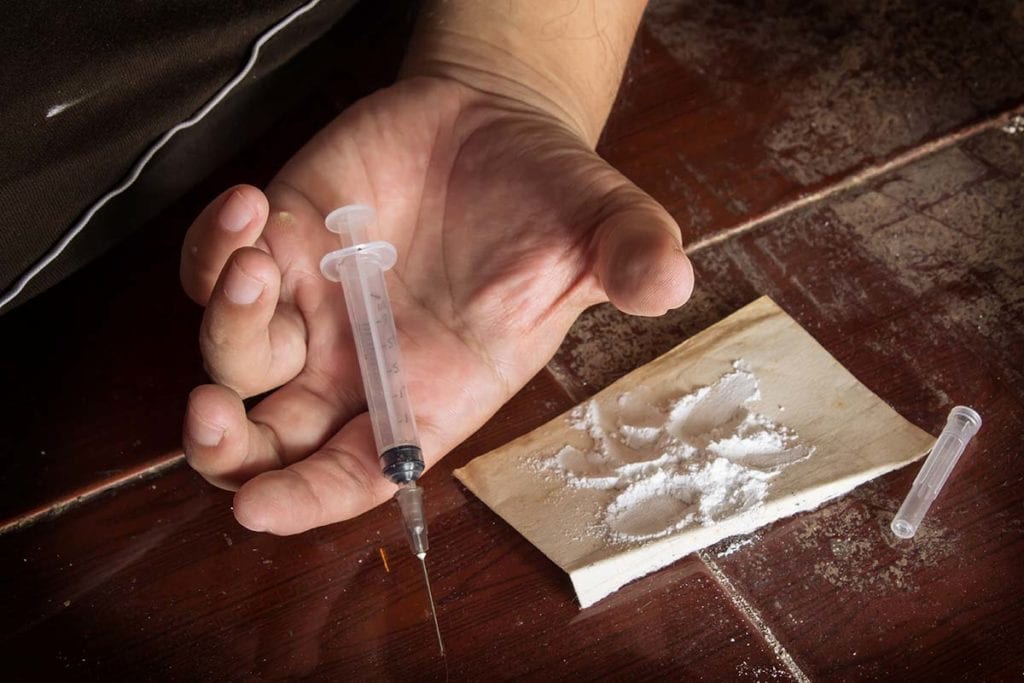Heroin is abused for the pleasurable feelings (euphoria) it provides. But not everyone who uses the opioid knows how dangerous it is. The drug can cause severe addiction as well as overdose. The sooner an individual gets help from a heroin addiction treatment center, the more likely they can avert heroin overdose symptoms. Knowing the symptoms and what do if you or someone you love overdoses on heroin can save a life.
What is Heroin Overdose?
Overdose can be a life-threatening or fatal consequence of heroin use. Heroin is an illegal man-made opioid drug that comes from morphine, a naturally-occurring opiate of the opium poppy plant. The DEA classifies heroin as a Schedule I drug that has no medical use and a high potential for abuse. Recently, overdose and deaths involving the drug continue to be the focus of the opioid abuse epidemic in the US. Opioids, such as heroin, were involved in 47,600 overdose deaths in 2017. Among the reasons for this is the practice of mixing the opioid with other drugs (polydrug abuse). That being said, a large dose of the drug can cause heroin overdose symptoms that can turn fatal without medical help.
Ways Heroin Use Can Lead to Overdose
Heroin overdose is often accidental as the user may not know he or she is taking an extremely potent or lethal dose of the opioid. Further, different scenarios can trigger heroin overdose symptoms. For example, taking too much of the drug. But there is no exact way to tell how much is too much. It all depends on the person’s health status, body chemistry, and tolerance level. Injecting heroin into the bloodstream (“shooting”) is also a dangerous and life-threatening practice. The drug goes straight to the brain and causes a faster and more intense high. Breathing and heart function slow, sometimes enough to be life-threatening. Slowed breathing can induce coma or cause permanent brain damage. Taking too much heroin can also lower oxygen in the blood to dangerously low levels (hypoxia) and can cause death. However, fatal overdoses are often the result of poly-drug use. For example, taking cocaine and heroin also known as “speedballing.”
Recognizing Heroin Overdose Symptoms
While injecting heroin is the most dangerous way to use the drug, smoking or snorting the opioid can also lead to overdose. But the signs of heroin overdose may not be easy to spot if the user or someone around them doesn’t know what they are. A person who sends too much heroin into the bloodstream may display one or more of the following symptoms. Bear in mind that symptoms may vary from person to person depending on the amount of the drug taken at the time.
- Pinpoint pupils
- Gasping for air
- Breathing is shallow or stops
- Low blood pressure or heart rate
- Bluish lips and fingertips or very pale skin
- Spasm, seizures, delirium, or disorientation
Heroin overdose symptoms can be fatal, but with prompt medical attention, the individual may survive. The person’s family member or a good Samaritan should call 911 or rush them to the nearest medical center. Once there, they can receive treatment to eliminate the signs of heroin overdose. Naloxone is approved by the U.S. Food and Drug Administration (FDA) for treating overdose symptoms. Timely treatment can reduce the risk of a fatality.
Heroin Addiction Treatment the The Ranch PA
The Ranch PA is a recovery center located in Hanover, PA, but also serves nearby cities. Although Pennsylvania has seen its fair share of heroin overdoses and deaths, people are seeking treatment to avoid the risks. We offer you an opportunity to start afresh through programs that are carefully designed to match your needs. Our recovery programs and therapies include:
- Medical Detox
- Dual Diagnosis Treatment
- Pain Management
- Individual & Family Therapy
- 12 Step and Non 12 Step Programs
- Motivational Interviewing
Are You Ready to Make that Life-Changing Decision?
No one should wait until they see the signs of a heroin overdose. Early heroin addiction treatment can save your life or the life of someone you love. In fact, you can start treatment today. To find out how to enroll in a program at The Ranch PA, please call 717.969.9126.

